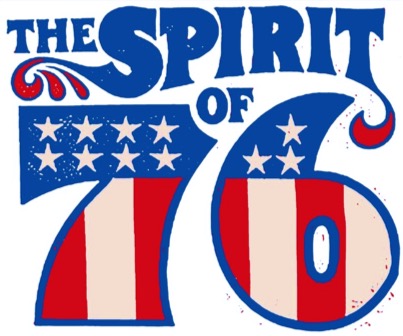Between the abyss and what goes on in Portland and the Magnificent Mile, there is for the moment nothing else but Trump standing in the breach.
The Party of 1776

Election 2020 is a choice between the America of the Founding and an America beset with guilt.
This post is the first in a series by Christopher Flannery (author of The American Story podcast) reflecting on America’s identity and founding ideals—and their implications for 2020.—Eds.
It was the first day of class and students were taking their seats. An earnest young sophomore came up and asked if she could make an announcement: a rally for social justice was taking place on campus that day. I told her that seemed an auspicious beginning to our semester.
We were studying what I thought was the greatest book yet written on the question of justice, Plato’s Republic. It is a book in which Socrates—reputedly the wisest of men—expresses great regard for justice, but claims that he knows next to nothing on the subject. The student’s concern with justice, like Socrates’, seemed perfectly reflective of the human condition. Human beings need justice. We can’t be complete without it. It is one of the perfections of human nature. An unjust man is a bad man, just as an unjust country is a bad country, and everybody knows this without the aid of philosophy, much less science. Every political community reflects this natural fact. As James Madison wrote in Federalist 51, “Justice is the end of government. It is the end of civil society. It ever has been and ever will be pursued until it be obtained, or until liberty be lost in the pursuit.”
The confidence of this young woman also seemed a reflection of the human condition. She knew that people ought to be just, and she knew what justice was with enough certainty that she could urge her classmates to join her in pursuing it, fighting for it. Like this young woman, every political community has a natural need of confidence in its justice. This confidence justifies asking fellow citizens for the ultimate sacrifice in the country’s cause, and it justifies punishing injustice. And yet, though every man and woman and every country needs confidence in its own justice, human experience and reflection repeatedly demonstrate that countries and men and women—like Socrates—regularly fall short of an adequate understanding of what justice is.
Cephalus, the good-humored old man who appears at the beginning of the Republic, very reasonably and unquestioningly assumes that justice is something like being honest and giving people what belongs to them. Socrates raises his usual questions about this sensible and confident view of justice, and it begins dimly to appear that you can’t be just without being prudent; nor can you be prudent without being just. A conversation ensues that has never been equaled in its searching depths, layers of complexity, and stunning beauty. At the end of this inexhaustible conversation, Socrates may be as uncertain as ever about what justice is, or prudence for that matter, but it seems clearer than before that men and women and countries by nature need both of these comprehensive virtues.
The American Declaration of Independence seems to confirm this. The people of the United States of America assume their separate and equal station among the powers of the earth by asserting a distinctively American principle of justice, “that all men are created equal [and] that they are endowed by their Creator with certain unalienable rights.” But immediately following that first famous assertion of American justice, the revolutionaries emphatically acknowledge the need for prudence in the application of justice: “Prudence, indeed, will dictate that Governments long established should not be changed for light and transient causes; and accordingly all experience hath shewn, that mankind are more disposed to suffer, while evils are sufferable, than to right themselves by abolishing the forms to which they are accustomed.”
The American experiment in self-government shows that it is not just in great books that justice and prudence can be seen as essential and inseparable virtues of political life. Just where this American principle of justice comes from, what it means, and how prudence must give it life, are among the greatest questions in American history. These questions have given rise to real-life conversations, deliberations, and actions comparable to Plato’s Republic in their scope and complexity, with the added compliment to humanity that they are the speeches and deeds of real men and women.
Things got real for Socrates, too, of course. Athens put him to death for the perceived injustice of his imprudent questions. And this, too, seems a reflection of the human condition: it seems that Socrates will always be with us, imprudently questioning the justice of our ways, and we will always imprudently be putting Socrates to death for his injustice.
1619
Nikole Hannah-Jones is confident of her justice. So is her employer, the New York Times. Her recent official job description was “domestic correspondent for the New York Times Magazine focusing on racial injustice.” Hannah-Jones and her employer are also confident of her prudence. She is, in her own word, the “architect” of the 1619 project launched by the New York Times a couple of months ago (see Lucas Morel’s essay on the project). The ambition of this project is to “reframe the country’s history, understanding 1619 as our true founding.” To understand 1619 as the true founding of America is to understand America as founded not on justice and prudence but on injustice and imprudence.
According to Hannah-Jones, 1619 marks “the beginning of American slavery,” when “Jamestown colonists bought 20 to 30 enslaved Africans” in August of that year. Hannah-Jones and her 1619 projecters understand the injustice of slavery to be more essential to America than the principle of justice proclaimed in 1776. In their view, which is more or less the view of the American multicultural establishment, “anti-black racism runs in the very DNA of this country.” A “racist ideology” governed Thomas Jefferson and the framers of the Declaration of Independence at the nation’s founding. When Jefferson and the other white Americans drafted and approved the famous words of the Declaration of Independence, “that all men are created equal [and] that they are endowed by their Creator with certain unalienable rights,” they did not mean to include their black slaves in the phrase “all men.” According to the ideology that governed the founding, “black people belonged to an inferior, subhuman race.” The imprudence that followed from this unjust ideology was that America did not immediately abolish slavery at the first moment of its independence.
Hannah-Jones says this 1619 Project is the most important work in her life.
She quite rightly wants to bring all the rigor at her disposal to getting all the facts and arguments right. “Every piece in here,” she writes about the 1619 issue of her magazine, “is deeply researched. It is backed up by historical evidence. Our fact checkers went back to panels of historians and had them go through every single argument and every single fact that is in here.”
Unfortunately, her rigor and precision and lucidity fall short in important ways. Lucas Morel points out some of these in his essay. Allen Guelzo and Timothy Sandefur remind us of other facts and arguments that anyone wanting to think seriously about these important questions would want to consider. I write here and cite these writings not to end conversation, but to begin one. It is a conversation about the justice and prudence that ought to govern America, and it requires as keen a searching attention from the best of minds as does the conversation in Plato’s Republic, with not only timeless but timely urgency, because not just our souls but our country and its cause are at stake.
1619, 1776, 2020
Of course, like Cephalus, and Athens, and Socrates himself, we are not likely to exhaust the questions of justice and prudence here. And while the conversation goes on, we all have decisions to make—this natural and unavoidable urgency of life plays hell with justice and prudence. To take just one decision that must be made by millions of Americans while some thousands of Americans devote themselves to thinking through America’s justice and prudence: if unforeseeable events don’t intervene and if we continue to follow law and precedent, on November 3, 2020, Americans have a president, and a House of Representatives, and a third of the U.S. Senate to elect, just to mention national offices. There are few questions more fundamental in those elections than the one we are discussing here: Is America a country with anti-black racism in its DNA, a country governed by an ideology according to which “black people belong to an inferior, subhuman race”? Or is America the country Abraham Lincoln and Martin Luther King, Jr. believed it to be: a country dedicated to the proposition that all men, meaning all human beings, are created equal?
The millions of Americans voting on November 3, 2020, will not have read Hannah-Jones’s essay, or this meditation, or the other essays I mention. Much less will they have read the many books written on these subjects, some of which I hope to discuss in future meditations. The politicians seeking their votes will not have read these either, though some of their staffers will have done. But very roughly speaking—because very rough speaking is generally all that is possible in politics—those politicians seeking office under the banner of the Democratic Party represent the thinking of those multiculturalist scholars, intellectuals, and journalists who believe the America founded in 1776 is a racist country, and that because racism is evil and worthy of hatred, the America of 1776 is evil and worthy of hatred. The Democratic Party is the Party of 1619.
And very roughly speaking, those politicians presenting themselves under the banner of the Republican Party represent the thinking of those non-multiculturalist scholars, and intellectuals, and journalists who believe the America of 1776 is the opposite of racist. They think that America stands for the distinctively American principle of justice proclaimed in 1776, that all men are created equal. And because this principle is good and even great(!), and what is good is lovable, and what is good and great is hugely lovable, America is worthy of love, worthy of huge love. The Republican Party, the Party of Lincoln, is the Party of 1776.
Leaving historical and philosophical subtleties and complexities aside, it would save a lot of ad money and place all other issues in a helpful perspective, I think, if we “reframed” our politics for a moment and made the elections on November 3, 2020, hinge on one question: Do you stand with the Party of 1619 or the Party of 1776?
The American Mind presents a range of perspectives. Views are writers’ own and do not necessarily represent those of The Claremont Institute.
The American Mind is a publication of the Claremont Institute, a non-profit 501(c)(3) organization, dedicated to restoring the principles of the American Founding to their rightful, preeminent authority in our national life. Interested in supporting our work? Gifts to the Claremont Institute are tax-deductible.
The American people should demand an answer.
The Left perfects the mob veto.
Our elite power brokers have chosen the CCP over us.
Democrats are laying the groundwork for revolution right in front of our eyes.
This is not a drill.




